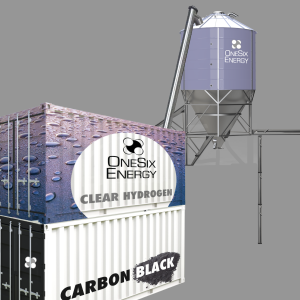
- Kim Kisner
- Business
- 07/08/2022
Dr. Gulay Serhatkulu, BASF Senior Vice President of Performance Materials North America is Creating Chemistry for a Sustainable Future

SBN Detroit interviews Dr. Gulay Serhatkulu, BASF Senior Vice President of Performance Materials North America. This business encompasses the entire materials know-how of BASF regarding innovative, customized plastics under one roof and is globally active in four major industry sectors – transportation, construction, industrial applications, and consumer goods.
Serhatkulu joined BASF in 2006 as a technical service representative. She has held a variety of roles with increasing responsibility within BASF including product management, marketing, sales, strategy, and most recently procurement.
Before BASF, she earned two postdoctoral appointments at the University of Nottingham, UK, and Wayne State University, respectively.
Serhatkulu shares with us some insights on the projects, goals, and challenges she leads every day.
Q: What is involved in your role in leading the sustainability team at BASF in the North American region?
A: Plastics do have proven benefits during their use phase – for example, preservation of food loss, lightweight construction of vehicles, and building insulation. Plastic waste, however, and in particular plastic waste in the context of marine littering, is perceived as a major global challenge. There is also increasing regulatory pressure regarding recycling quota and recyclability on the one hand and strong commitments of our customers towards increasing the share of recycled material in their offerings on the other hand. Solving these challenges requires innovation and joint efforts globally across the value chain.
A team across BASF has taken up this challenge and developed the ChemCycling™ project which focuses specifically on transforming plastic waste into a raw material using pyrolysis, a thermochemical process. The raw material can be fed into the existing assets to create new chemical products with excellent product performance based on recycled plastic waste. Besides ChemCycling, BASF offers other mass-balanced chemical or advanced recycling solutions based on different post-consumer and post-industrial feedstocks. In this case, the recycled feedstock is not a pyrolysis oil and is introduced as an intermediate during the manufacturing process and not at the very beginning as is the case of pyrolysis oil.
Chemical recycling represents an exciting business opportunity for us and our customers, as the resulting products are of equal quality to the products derived from fossil feedstock. Nevertheless, many technical, economic, and regulatory questions have to be answered but we are eager to work on it and optimistic that we can cope with all challenges.
Q: What are you currently working on in terms of sustainability for BASF?
A: One great example is the BASF and Steelcase collaboration on the brand’s new Flex Perch Stool, which has sustainability and circularity at the forefront of its design.
This is the first furniture product for Steelcase that uses plastics derived from a chemical or advanced recycling process. The stool is made with BASF’s Ultramid® B3EG6 Ccycled™, an injection moldable polyamide (nylon) 6 that utilizes material from a waste stream generated during electronics production and is a one-for-one replacement for the 100% fossil-derived plastics.
I cannot stress enough the importance of value chain partnership to achieve these types of major breakthroughs.
From a lightweight perspective, I can also point to a collaboration with Toyota on their Sienna. We also work with footwear companies to provide plastic and foam materials that have sustainability benefits such as being bio-based and recyclable.
The new Sienna generation first-of-its-kind third-row free-standing seat backs.
We also have efforts for Climate protection. Climate change and global warming are among the most pressing challenges of our time. On our journey toward climate neutrality, we have set ourselves ambitious goals and are striving worldwide to achieve net-zero CO2 emissions by 2050. At the heart of the long-term transition toward net-zero CO2 emissions by 2050 is the use of new technologies, which will replace fossil fuels such as natural gas with electricity from renewable sources.
Additionally, we engage our suppliers in our ambition to serve our customers with the lowest carbon footprint materials possible. In our Supplier CO2 Management Program, we first aim to achieve transparency on the product-related CO2 emissions of our purchased raw materials. In this phase, we offer our support and share our knowledge on Product Carbon Footprint valuation methodologies and tools with our suppliers.
Q: What are your longer-term goals there?
A: We want to live up to our purpose: We create chemistry for a sustainable future. We are only successful if our products, solutions, and technologies add value to society. Therefore, we want to make a positive impact on society and safeguard our planet. To drive the sustainability transformation, we focus on three key topics: Climate change, Circular Economy, and a safe and sustainable portfolio. We are striving worldwide to achieve net-zero CO2 emissions by 2050.
Q: What are the challenges you face?
A: I see two main challenges. First, new technologies like electrically heated crackers, electric steam generation, carbon capture, and storage technologies need to be developed to achieve our targets. Some of these will take time to develop and they will first need to be piloted before being scaled up. Second, we need a supportive and enabling regulatory framework if the transformation is to succeed.
Q: From your perspective, what role does BASF as a business play in terms of sustainability for the surrounding community?
A: We measure the overall impact of economic, environmental, and social aspects of our business activities with our Value to Society methodology. We take sustainable use of water and preserving biodiversity seriously.
Our global target is to implement sustainable water management at all production sites in water stress areas and our connected sites by 2030.
We periodically investigate our production sites around the world to revise which are located near internationally protected areas. We connect with external stakeholders and networks to discuss our sustainability strategy.
One local example is Fighting Island. Owned by BASF, Fighting Island is a 1,500-acre island on the Canadian side of the Detroit River in LaSalle, Ontario. The island was historically used for storage of lime tailings, a byproduct of soda ash production, in settling beds. Since closing the settling beds in 1982, BASF’s efforts have led to native revegetation and reforestation to help prevent erosion, reduce dust, increase wildlife habitat, control runoff, and enhance the island’s appearance. You can read more about the island being certified gold by the Wildlife Habitat Council here.
Q: What advice would you give others in business looking to start sustainability efforts?
A: Engaging with the customers is a key success factor. Sustainability targets of different industries or customers may look different. Some industries focus on renewable content, some recyclable content, and some CO2 footprint of their products. In the end, a business can only be successful if it can stay relevant to its customers. So the first question should be, what is important for the customers, followed by how to get there.
To the ACC (American Chemistry Council), sustainability is a team effort. Some of the challenges like the regulatory framework are relevant for all the industry players. I find our work at ACC very valuable as we bring many stakeholders together and can see the problems from various perspectives.
Q: What are the most impactful things a business can do to really make a difference?
A: The first thing that comes to mind is: short-term investments in innovation, renewable energy, and new technologies for long-term gain. Every business can look at their carbon footprint, water use, and impact on biodiversity and make necessary adjustments.
Be sure to subscribe to our newsletter for regular updates on sustainable business practices in and around Detroit.
Kim Kisner
- All
- Business
- Community
- Education
- Events

Eastern Market Partnership, in collaboration with the City of Detroit’s Office of Sustainability Urban Agriculture Division, has announced $240,000 in grant funding to support Detroit-based farmers and farmer collectives. The grants will advance food access, climate education, sustainable land use, and economic opportunity, with priority given to Black- and Indigenous-led farms, youth-led initiatives, and projects rooted in historically disinvested neighborhoods. The recipients – ranging from cooperatives and community...

Citizen Robotics is a Detroit-based nonprofit that advances the use of robotics and digital manufacturing in residential construction, focusing on improving productivity, sustainability, and long-term affordability. Best known for its early work in 3D-printed housing, it explores how alternative construction methods and new financial models can reduce material waste, lower lifetime operating costs, and enhance the resilience of homes. SBN Detroit interviewed Tom Woodman, founder and president of...

Detroit-based OneSix Energy is a clean-energy technology company focused on advancing a lower-carbon approach to hydrogen production. Headquartered at Newlab in Detroit, the startup is developing a proprietary methane pyrolysis system designed to produce hydrogen without carbon dioxide emissions, while also generating solid carbon as a co-product. SBN Detroit interviewed with cofounder Stefan Sysko about the company’s origins, its approach to hydrogen production, and why Detroit is positioned...







